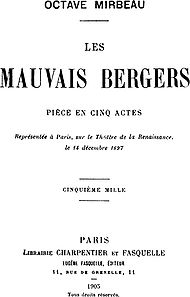
Les Mauvais bergers
Encyclopedia

Octave Mirbeau
Octave Mirbeau was a French journalist, art critic, travel writer, pamphleteer, novelist, and playwright, who achieved celebrity in Europe and great success among the public, while still appealing to the literary and artistic avant-garde...
, performed in December 1897 on the stage of Théâtre de la Renaissance
Théâtre de la Renaissance
The name Théâtre de la Renaissance has been used successively for three distinct Parisian theatre companies. The first two companies, which were short-lived enterprises in the 19th century, used the Salle Ventadour, now an office building on the Rue Méhul in the 2nd arrondissement.The current...
, in Paris, then published by Charpentier-Fasquelle in March 1898. The main parts were played by the two most famous French actors of the time: Sarah Bernhardt
Sarah Bernhardt
Sarah Bernhardt was a French stage and early film actress, and has been referred to as "the most famous actress the world has ever known". Bernhardt made her fame on the stages of France in the 1870s, and was soon in demand in Europe and the Americas...
, as Madeleine, and Lucien Guitry
Lucien Guitry
Lucien Germain Guitry was a French actor.In 1885, while living in Saint Petersburg, he appeared at the French Theatre. His son, the future actor, writer and director Sacha Guitry, was born in Saint Petersburg and named in honour of Tsar Alexander III...
, as Jean Roule.
The play has not been translated into English.

Plot summary
This is the story of a workers' strike, which is opposed by the boss, Hargand, and cruelly crushed in blood by the army, in a situation similar to that of Émile Zola's famous novel Germinal. But, while Zola's ends on a note of hope, with an imagery evoking future germinations, Mirbeau's play ends in pessimism, with the triumph of death: all the strikers are killed, including Jean Roule, the leader, and his lover, the young and pregnant Madeleine. Even Robert Hargand, the boss' son who supported the strikers and tried to stop the massacre, will not survive. No hope, or possibility of renewal in future generations is left, only certainty there will be no germination.This play is inspired by anarchist politics, particularly evident in Jean Roule's speeches, yet it neither presents itself as propaganda nor offers a solution to the social question.

